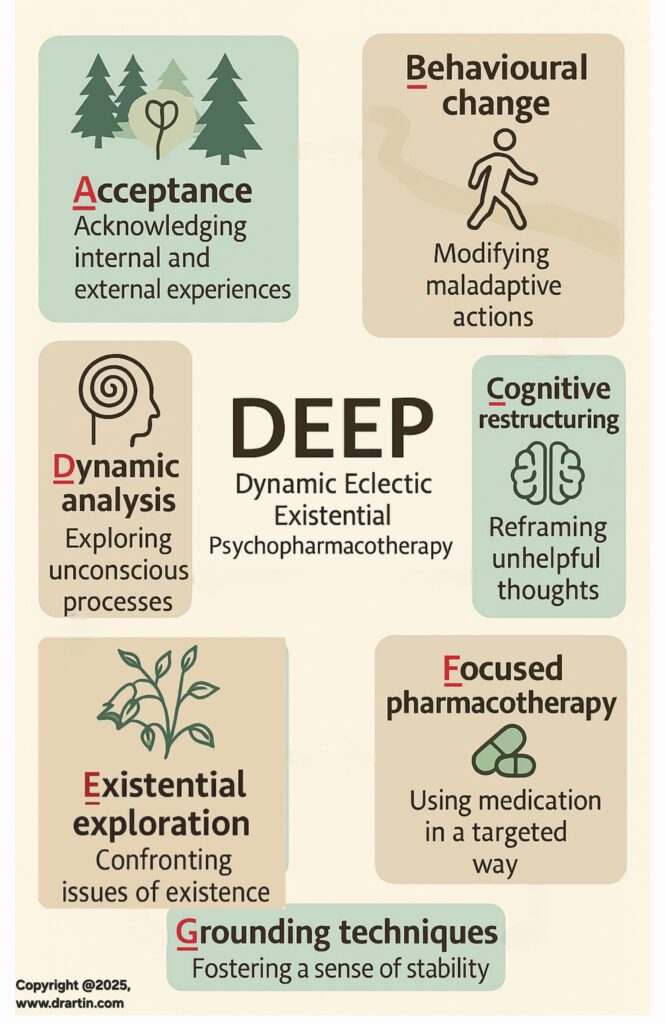Human rights-based approaches share common ground with Existential Philosophy and complement each other in achieving a holistic approach to mental health. Therefore, integrating them into Rights-based Existential Psychiatry (REP) creates a comprehensive framework that seeks to redefine how mental health conditions should be understood and treated. REP does not propose a rejection of existing psychiatric knowledge or schools but rather a reorientation, one that restores depth, dignity, and agency to mental health care while maintaining scientific integrity and evidence-informed practices. At its core, REP combines the ethical imperative of human rights-based care with its emphasis on autonomy, non-coercion, and shared decision-making, with the existential understanding of psychological suffering as a confrontation with the core conditions of human existence. This synthesis produces a model that is not only clinically effective but also morally and philosophically sound.
Human rights-based Psychiatry: an approach to mental health care that is grounded in the principles of human rights and focuses on protecting and promoting the rights of individuals with mental health conditions. It recognises that people with mental health conditions have the same inherent human rights as anyone else, and these rights should be respected, protected, and fulfilled throughout all aspects of their care.
At its core, human rights-based psychiatry emphasises the principles of dignity, autonomy, non-discrimination, and participation. It acknowledges that individuals with mental health conditions have the right to make decisions about their own treatment, to be free from coercion or forced treatment, and to be involved in the decision-making process regarding their care. It also recognises the right to privacy, confidentiality, and access to information.
In addition, human rights-based psychiatry promotes the importance of providing mental health services in the least restrictive environment possible. This means ensuring that individuals are supported in community-based settings rather than being unnecessarily confined to institutions or hospitals.
Collaboration and partnership between mental health professionals, individuals with mental health conditions, families, and communities are fundamental to the practice of human rights-based psychiatry. It seeks to empower individuals, respect their diverse experiences and perspectives, and involve them as active participants in their own care.
Overall, human rights-based psychiatry aims to create a mental health care system that upholds and promotes the rights and dignity of individuals with mental health conditions, fostering an environment of respect, empowerment, and recovery.
Existential Psychiatry: draws on existential philosophy to understand and address mental health conditions. Existential philosophy explores questions about human existence, meaning, freedom, responsibility, and the nature of reality. Existential psychiatry applies these philosophical principles to the field of mental health, emphasizing the subjective experience of individuals and their search for meaning in life.
Key concepts in existential psychiatry include:
- Death: the concept of death plays a profound role in shaping the individual's understanding of existence and the human condition. Death is not merely viewed as a biological event but as an existential reality that defines the very essence of human existence. The awareness of one's mortality serves as a catalyst for self-reflection and an impetus for individuals to confront the fundamental questions of meaning, purpose, and authenticity in their lives. Existential psychotherapy encourages individuals to grapple with the inevitability of death, fostering a deeper appreciation for the fleeting nature of time and the urgency to create a meaningful and purposeful existence. By embracing the existential anxiety associated with mortality, individuals are prompted to make choices that align with their authentic values, contributing to a richer and more fulfilling life experience. Death, in this context, becomes a poignant and transformative force, propelling individuals toward a more profound engagement with their existence.
Freedom, Choice and Responsibility: Individuals have freedom of choice and are responsible for their actions. In the context of mental health, this involves exploring how individuals navigate their choices and take responsibility for their life and mental well-being.
Meaning and Purpose: Existential psychiatry strongly emphasises the search for meaning and purpose in life. Mental health difficulties may be viewed as linked to a lack of meaning or an existential crisis, and therapy may focus on helping individuals find or create meaning in their lives.
- Isolation and Connection: Existential philosophy explores the tension between individual isolation and the need for connection with others. Existential psychiatry may address issues related to loneliness, social isolation, and the human need for meaningful relationships.
- Authenticity: Existentialism advocates for living authentically, being true to oneself, and making choices that align with one's values and beliefs. In the context of mental health, this can involve exploring how individuals can live more authentically and align their actions with their true selves.
- Existential Angst refers to the fundamental anxiety that arises from the awareness of one's existence, mortality, and the uncertainty of the future. Existential psychiatry explores how individuals cope with and make meaning out of this anxiety.
Overall, existential psychiatry is a framework for understanding and approaching mental health issues incorporating existential principles, to help individuals explore and navigate their existential concerns and to encourage a holistic understanding of individuals and their mental health struggles within the broader context of their existential experience.
